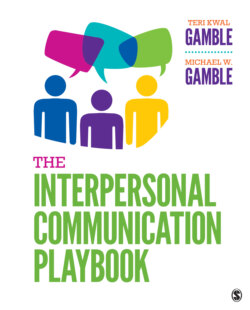Читать книгу The Interpersonal Communication Playbook - Teri Kwal Gamble - Страница 80
На сайте Литреса книга снята с продажи.
We Compare Ourselves with Others
ОглавлениеAccording to social comparison theory, we compare ourselves to others to develop a feel for how our talents, abilities, and qualities measure up to theirs.15 In other words, to learn more about ourselves, we use others as measuring sticks, evaluating ourselves against them. As we compare ourselves to others, we form judgments of our skills, personal characteristics, and so on. We can, for example, decide whether we are similar or different, better or worse, stronger or weaker, or more or less creative than those with whom we compare ourselves. Often, as we assess our similarities and differences, we also make decisions regarding the groups we fit into. Generally, we are most comfortable interacting with others we perceive to be like us.16
Our self-esteem suffers if we continually feel we fall short when gauging ourselves in relation to others. When this happens, however, it could be because we have chosen to compare ourselves to an inappropriate reference group. For example, if we compare our looks with those of a supermodel, our musical ability with those of the winner of The Voice, or our athletic prowess with that of an Olympian, we probably are making an unfair comparison and, as a result, will develop an unrealistic assessment of our appearance, talent, or ability. If we compare ourselves with members of a more appropriate reference group, we might be able to inflate rather than deflate our sense of self.
Our accuracy in assessing our self-concept and self-esteem depends on how successful we are at processing experience and receiving feedback. If we pay more attention to our successes than to our failures and to positive reactions than to negative ones, we could end up overinflating our sense of self. On the other hand, if we pay more attention to our failures and give more credence to negative reactions, then our sense of self could deflate. In neither instance would our sense of self conform to reality.
People with normally high self-esteem tend to be happier17 and less affected by peer pressure than those who have low self-esteem.18 Individuals with healthy self-esteem are not self-absorbed. Rather than filling themselves with “unwarranted self-regard,” they have a realistic sense of their abilities.19 In touch with both their strengths and their weaknesses, they display grit—a combination of passion and perseverance for a singularly important goal, together with resilience and a tolerance for feeling frustrated.20 Ultimately expecting a positive outcome, they persist in spite of failure. They are both confident and resilient, traits necessary for success.21 To build resiliency and increase your chances of adjusting positively to change or disappointments try the following:
Limit negative self-talk. In lieu of telling yourself that “I’m a loser,” think, “I did something foolish, but I can fix it.”
To regain composure after a disappointment, place yourself figuratively or physically in another setting for a few moments.
To improve your mood and productivity, relax your posture, put a smile on your face, and engage others with a warm tone of voice.
Seek a friend to spend time with, even if it’s just to take a walk. Having a friendly relationship increases satisfaction and energy.22
Researchers assert that high self-esteem is an effect of good performance, rather than its cause. According to J. D. Hawkins, President of the National Self-Esteem Association, “Self-esteem is more than just feeling good about yourself. It’s about being socially and individually responsible.”23
Try This: Me, You, and Popular and Social Media
1 Consider how celebrities online and offline affect your picture of yourself. For example, how is your self-evaluation influenced by exposure to the lifestyles and standards of living experienced by pop-culture icons such as the Kardashians?
2 When texting or messaging friends, many of us now use a personal emoji, often a caricature of ourselves. Typically, while the emoji we create may resemble us, and we may even make it lightly mocking, many of us make it more physically pleasing—as if it represents our “better self.”
3 If you haven’t done so, download the Bitmoji app and create one to represent you. Explain the ways in which this selected public image represents an extension of yourself and what you hope it communicates to others.24 Also explain what it suggests about your online level of honesty.
4 Consider how you feel after spending time on social media. Do you ever find yourself suffering from FOMO (fear of missing out) after discovering your friends at an event without you? In general, do you feel better about yourself or worse about yourself once you log off? Be specific. To what do you attribute these feelings?
